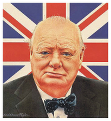|
by Andrew Roberts, Churchill: Walking with Destiny [Churchill] was also highly critical of the Talibs, the tribe from whom the modern Taliban derive their name; they were, he wrote, 'as degraded a race as any opn the fringe of humanity: fierce as a tiger but less cleanly; as dangerous, not so graceful'. He believed their insistence on a rigid form of Islam kept the Afghan people in 'the grip of miserable superstition'. His view was that their 'religion, which above all others was founded and propagated by the sword...stimulates a wild and merciless fanaticism'. Islam, he further stated, increases, istead of lessens, the fury of intolerance. It was originally propagated by the sword, and ever since its votaries have been subject, above the people of all other creeds, to this form of madness. In a moment the fruits of patient toil, the prospects of material prosperity, the fear of death itself, are flung aside. The more emotional Pathans are powerless to resist. All rational considerations are forgotten. Seizing their weapons, they become Ghazis [anti-infidel fanatics] — as dangerous and as sensible as mad dogs: fit only to be treated as such.'Civilization is confronted with militant Mohammedism,' he concluded. 'The forces of progress clash with those of reaction. The religion of blood and war is face to face with that of peace. Luckily the religion of peace is usually the better armed.' On the North-West Frontier and soon again in the Sudan, Churchill saw Islamic fundamentalism up close. It was a form of fanaticism that in many key features — its sheer implacability, contempt for Christianity, opposition to liberal Western values, addiction to violence, demand for total allegiance and so on — was not unlike the political fanaticism he was to encounter forty years later. None of the three British prime ministers of the 1930s — Ramsey McDonald, Stanley Baldwin and Neville Chamberlain — had ever personally encountered such extremism in their personal lives, and they were tragically slow to discern the nature of Nazi ideology. Churchill had fought against fanaticism in his youth, and recognized its salient features earlier than anyone else. |
 Sir Winston Churchill 1874-1965 |

